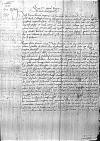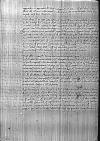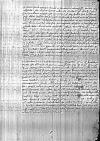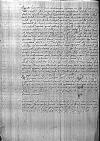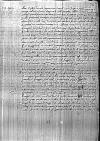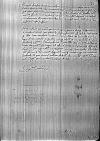Cum ⌊hinc⌋ nuntium, quem ⌊dominus collega meus⌋ ex ⌊Neapoli⌋ huc ad me miserat 1525-09-10⌊decima Septembris praeteriti1525-09-10⌋ expedivissem cum illo longo volumine, de omnibus Maiestati Vestrae Serenissimae copiose scripsi et ⌊⌋ meas ad manus domini collegae mei transmisi, quas reor cum primis Maiestati Vestrae Serenissimae deferri curavit. Ex iis omnia et quae ⌊Statum Barensem⌋ ac istius temporis et curiae historiam spectant, intellexit. Ea quae interea se obtulerunt, quantum per angustiam hanc scribendi licet, sic se habent.
Aeger fuit plurimum serenissimus ⌊rex Franciae⌋ acuta et cotidiana febri, ut etiam medici de salute illius desperarent, qua de re ⌊caesar⌋ ex ⌊Segovia⌋ versus ⌊Madrillas⌋ ad invisendum eum acceleravit, invenitque eum in lecto vix caput attollentem illumque humaniter salutavit et boni animi esse iussit, quodque nihil aliud, quam salutem suam curaret adhortatus est, de reliquis negotiis bonam spem pollicitus. Ad ea ⌊rex⌋ dignas gratias habuit Deo imprimis, quod ⌊caesari⌋ eam benignitatem indidisset et quod illum videre coram, quemadmodum id dudum desiderasset, licuisset, deinde caesari, quod cum invisere captivum suum dignatus fuisset, commendans illi, si moreretur, liberos suos, ferunturque simul una sine arbitris ad decursum unius horae fuisse. Et postquam ab eo ⌊caesar⌋ discessisset ⌊regem⌋ dixisse aiunt, „pereant illi, qui inter nos ista dissidia fecerunt. ⌊Iste⌋ne est iuvenis tam deformis ut monstrum et sine ingenio balbutiens?” laudavitque summe eius prudentiam et facundiam. Supervenit interea, morbo magis invalescente, domina ⌊dux de Alenchon⌋, soror ⌊regis⌋, admissa ad illum per ⌊caesarem⌋, quae sua praesentia non parum illius saluti profuit, nam cum rex in 24 horis in extasi nihil fuisset locutus et huc iam pro mortuo descriptus, illa, ut fertur, plurimum religiosa post missam ante regem habitam cum sacerdote, accepto sacramento Corporis Domini, genibus flexis monstrante hostiam sacerdote, regem ante lectum alacri vultu et voce sic dicitur fuisse allocuta: „domine frater, cognosce Deum et creatorem tuum.” Ille suspiciens lacrimosis oculis, cum tanto tempore nihil fuisset locutus, miraculose respondit: „cognosco et paratus sum, licet indignus, et peto mihi eum dari”. Dataque fuit illi cum omni admiratione Eucharistia, et ex eo tempore melius habere coepit iamque bene convaluit.
Cum ⌊rex⌋ in eo esset vitae discrimine, subito se huc ad consultandum ⌊caesar⌋ contulit erantque hic aliquot diebus et noctibus etiam perpetua consilia. Eo enim mortuo omnia essent inversa fuissetque dubium, ubi se iste fluctus frangeret. Sed convalescente rege, rursus se inclinati animi erigebant. Venit interim ⌊huc⌋ 1525-09-29⌊paenultima Septembris1525-09-29⌋ praeteriti legatus ⌊pontificis⌋, ⌊cardinalis Salviatis⌋. Ivit ⌊illi⌋, vocatis ad se omnibus oratoribus, ⌊caesar⌋ obviam extra ⌊civitatis⌋ portam et cum in illo tumultu et pulvere, qui fuit densissimus, legatum excepisset, deinde nos oratores sigillatim quemlibet digito demonstrando, cuius quisque principis esset, edocuit, illumque magno cum honore ad sinistrum latus obequitantem usque ad ecclesiam maiorem conduxit et accepta benedictione illic reliquit, ubi deversorium paratum habuit.
Post ⌊illius⌋ ingressum 1525-10-01⌊tertia die1525-10-01⌋ dominum ⌊legatum⌋ accessi, qui me certe humaniter pro honore Maiestatis Vestrae Serenissimae excepit extra cameram suam mihi obvius, in quam ingressi, feci ea ad illum verba, quae et Vestra et ⌊reginalis Maiestas⌋ mihi aliquoties praescripsit et quae ad hoc tempus expedire videbantur, edoctusque a me, quomodo negotium ⌊Status Barensis⌋ haberet, reservationem ⌊castri Barensis⌋ admiratus est pollicebaturque operam suam, quemadmodum a ⌊sede apostolica⌋ illi foret commissum, opportuno tempore apud ⌊caesarem⌋ se temptaturum, si castrum hoc expugnare posset, quod in dies exspecto; sed timeo, frustra scalas eum admoliturum, causis his obicibus, quas abunde novissimis meis litteris Maiestati Vestrae Serenissimae descripsi.
Appulerat huc etiam, rege melius habente, 1525-10-03⌊tertia Octobris praeteriti1525-10-03⌋ domina ⌊dux de Alenchon⌋, cui ⌊caesar⌋ usque ad portam ⌊civitatis⌋ iverat obviam sine oratoribus illamque dextrum latus in progressu habentem usque ad domum illi paratam conduxit et cum illa usque fere in conclave, multo sermone utrimque habito, ingressus, osculo, more Gallico, dimisit. Sequenti die primos de consiliariis suis pro ⌊illa⌋ misit, cumque in palatium venisset, iterum illi usque ad gradus processit obviam et iterum osculo excepit. Tandem in penetralia introgressi, paucis utrimque adhibitis, per aliquot horas inter eos tractatum est, ferturque, ⌊caesar⌋ has condiciones proposuisse: imprimis, ut ⌊rex Galliae⌋ tres milliones pro damno bellico persolveret et deinde se ⌊Romam⌋ cum eo ad coronationem conferret, restituta prius ⌊Burgundia⌋ et, pro maiore istarum rerum firmamento, ⌊filio⌋ suo primogenito Delphino et successore pro obside dato, donec omnia perfecta essent. Dicunturque ⌊Galli⌋ unam millionem hoc est decem centena milia ducatorum et eam profectionem ⌊regis⌋ ad ⌊Urbem⌋ obtulisse, ⌊Burgundiam⌋ vero coram ⌊pontifice⌋ in decisionem iuris deposuisse, obsidem autem quasi non necessarium omnino negasse. Post hos tractatus, cum quater ⌊domina dux⌋ soror ⌊regis⌋ apud ⌊caesarem⌋ fuisset, re infecta et in ulteriorem deliberationem accepta, discessum est. Nihilominus ⌊caesar⌋ ⌊dominam hanc⌋ hinc exeuntem, cum ipse venatum etiam iret, conductu extra ⌊civitatis⌋ portam persequebatur. Illaque adhuc in ⌊Madrill⌋ apud ⌊fratrem⌋ agit, misso celeri ad ⌊matrem⌋ ac parlamentum in ⌊Franciam⌋ de iis rebus tabellario. Adhuc quid sperandum sit, incertum est.
Habentur hic mirabiles tractatus. Propositum est hic ex Brabantia praeter ista coniugia, de quibus in novissimis scripsi, quod ⌊regi Franciae⌋ domina ⌊Margereta⌋, maior ⌊caesaris⌋ amita, iungeretur et quod illa nomine caesaris exsistens regina Franciae praeesset Burgundiae. Si non procrearent liberos, parum referret, cum illorum rex Franciae iam satis haberet; et quod Delphino Franciae filia regis Portugaliae et Leonorae, sororis caesaris, daretur in coniugem, quo omnia pacta certius firmarentur. Multi multa proponunt. Quid subsequetur, exitus docebit. Parum adhuc temporis ad indutiarum exspirationem, hoc est ad primum Ianuarii diem restat. Quod si nihil interea certi concludetur, nescio quomodo ab utraque parte ulterius, nervo utrimque deficiente, erit belligerandum, praesertim rege in captivitate exsistente, qui omnibus modis cupit liberari, ferturque caesar illi dixisse, cum boni animi eum esse iuberet, quod sic eum velit tractare, quemadmodum ipse vellet tractari si apud illum in similem fortunam incidisset, verumtamen intellego bonum hunc regem non nisi valde gravate hanc captivitatem ferre, spem licet vultu simulet, qui intimo dolore non caret.
Agente hic domina duce de Alenchon libenter me illa vidisset et ego illam vicissim, sed ne qua suspicio de utrisque fieret, consulto cavimus; fuit tamen apud me Venceslaus Zaramba, qui illi servit, relictus a magnifico domino palatino Siradiensi. Ille me excusavit et mihi rursus ab ea rettulit, quod si per Gallias aliquando redirem, me omnino ad illam conferrem, habituram se aliqua verba mecum de iis rebus, quas illic dominus palatinus Siradiensis egerat. Quod pollicitus sum. Ego illi rursus significavi, quomodo Serenissima Maiestas Vestra mihi litteris suis iniunxisset, postquam huc legatus pontificis et serenissimi Hungariae etc. regis orator applicuissent, quod pariter cum illis ad hanc pacem conficiendam omnes conatus impenderem, et licet orator Hungarus Romae remanens huc non venisset, ego tamen mandatis Maiestatis Vestrae Serenissimae insistens caesarem nomine Maiestatis Vestrae modis omnibus ad concordiam ineundam cum rege christianissimo adhortatus fuissem, exponendo difficultates et discrimina, in quibus hoc potissimum tempore Respublica Christiana versaretur, et quod caesar Maiestati Vestrae Serenissimae de hac fraterna adhortatione gratias habuisset et se pacem cupere summopere asseruisset, pollicitus, se omnem daturum operam, quo universalis aliquando conficeretur. Haec etiam sic egi nomine Maiestatis Vestrae Serenissimae cum caesare. Fuit dominae duci haec sollicitudo, quam ad hanc pacem gerit Maiestas Vestra, plurimum grata, postulavitque a me, ut ubi se occasio offerret, modis omnibus huic Maiestatis Vestrae Serenissimae sancto desiderio me accommodarem. Quod post caesarem apud dominum magnum cancellarium aliquoties egi et illi desuper litteras et mandata Maiestatis Vestrae Serenissimae ostendi, qui mihi respondit: nimium tardi et segnes in agendo sumus, timeo, ne flagellum Dei ex hac somnolentia nos excitabit; res certe omnis, quantum ego coniectura consequi possum, in moram ducitur. Quid ex ea Deus futurum esse voluerit, cum magno fortassis detrimento aliquando facient periculum.
Firmatum est 1525-10-10⌊decima mensis praeteriti1525-10-10⌋ coniugium inter ⌊caesarem⌋ et regis Portugaliae sororem, magna vi, ut fertur, auri, unde nunc fama est, quod in fine istius mensis caesar in ⌊Sivilia⌋, quae Hispalis dicitur, constitui debeat pro istius matrimonii consummatione. ⌊Illac⌋ ⌊caesarem⌋ omnes sequemur, iterum novi sumptus erunt necessarii et ego adhuc sicuti ⌊reginali maiestati⌋ scripsi, nullam a ⌊domino Ludovico⌋ accepi provisionem praeter trecentos ducatos, quos ⌊hic⌋ 1525-07-03⌊tertia die Iulii praeteriti1525-07-03⌋ accepi, durabantque usque ad mensis Septembris decursum, unde hic rursus per datos fideiussores ducentos ducatos in mutuum accepi, ut collega meus, dominus Ludovicus, illos ⌊Neapoli⌋ persolveret; Quod si non fiet, ego depactabor. Eo modo hic hactenus vixi et nisi factores dominorum ⌊Fuggarorum⌋, nullam a Vestra Regia aut ⌊reginali Maiestate⌋ habentes commissionem, mihi affuissent, dudum hic cum ignominia et rerum mearum iactura discedere coactus fuissem. Nihilominus mihi interdicitur, ne deinceps quicquam a ⌊Fuggaris⌋ in mutuum accipiam, cum etiam mihi aliunde nihil mittitur, unde erit vivendum? Et praesertim, si is hic esse debeo, ut fui hactenus Serenissimae Maiestatis Vestrae orator. Potest mihi tuto Maiestas Vestra Serenissima credere, quod nullum hic mihi promercale aurum est, nec erit in reditu. Quo circa iterum mihi ad ⌊Fuggaros⌋ confugiendum erit, qui ad honorem Serenissimae Maiestatis Vestrae me numquam deseruerunt.
1525-11-01⌊Hodie1525-11-01⌋, quae est dies Omnium Sanctorum et natalis meus, cum apud caesarem cum oratoribus aliis essem antequam iret ad missam, vocato me et magno cancellario, per illum mihi referri iussit, quomodo dominus Iacobus Fugger, suae maiestatis consiliarius fidelis dilectus, multa bona in auro, cupro et aliis rebus circa fodinas montium in Hungaria habuisset, quae omnia illi per quandam iuris apparentiam vi fuissent in Hungaria ablata contra omnem aequitatem et veram iuris formam. Qua de re cum dominus Iacobus Fugger de maiestate sua multifariam esset bene meritus indignumque foret, quod eo pacto per vim illius bona diripi deberent, sua maiestas serenissimo Hingariae regi et Ferdinando, archiduci fratri suo, omnibusque in conventu imperii principibus scripsisset, ad hoc animum intenderent, ut domino Fugger bona illius omnimode restituerentur. Et cum sua maiestas de prudentia ac aequitate Maiestatis Vestrae Serenissimae plurimum confideret illamque et apud serenissimum Hungariae regem et illius regni consiliarios magnam auctoritatem habere sciret, mihi hoc idem negotium, qui hic Serenissimae Maiestatis Vestrae nomine agerem, iniungere decrevit, hortareturque me, ut hoc domini Fuggeri negotium nomine suae caesareae maiestatis magna cum diligentia Maiestati Vestrae Serenissimae commendarem rogaremque, ut intuitu suae caesareae maiestatis ac etiam, quia id ipsa aequitas expostularet Maiestas Vestra Serenissima illi apud serenissimum Hungariae regem nepotem suum et apud illos consiliarios adesse velit, quo bona sua recuperare posset et hanc suae caesareae maiestatis commendationem sibi plurimum profuisse sentiret, quod sua maiestas omnibus studiis et fraternis officiis Maiestati Vestrae Serenissimae rependere et semper referre vellet. Meque ea in re singulariter Germanice ⌊sua maiestas⌋ est allocuta his verbis: „thut das Beste.” Quapropter, Serenissime Rex, cum hoc negotium caesareae maiestati sic curae et cordi esse intellego et quod etiam dominus Iacobus Fugger aliquoties Maiestati Vestrae Serenissimae libenter inservivit et ego in servitio Serenissimae Maiestatis Vestrae ab eo non parvam benevolentiam expertus sum, humillime Maiestati Vestrae Serenissimae supplico, ut maiestas caesarea aliquid ea in re Maiestatem Vestram fecisse cognoscat: dignetur huic bono viro, sic bonis suis spoliato, ubi id opportunum cognoverit, ope et intercessione sua adesse. Rem maiestati caesareae profecto gratissimam et illi summe necessariam et qua illum perpetuo sibi devinciet factura, et ut hic dicere possem, Maiestatem Vestram Serenissimam libenter semper re ipsa maiestati caesareae gratificari solere. Haec quemadmodum mihi a maiestate caesarea scribenda sunt commissa in notitiam Maiestatis Vestrae Serenissimae deducenda existimavi.
Essent plurima alia scribenda, sed cum haec posta hac nocte hinc proficiscitur in compendium omnia conferre cogor aliquando de iis longiore volumine scripturus, quando haec tragoedia, quorsum adhuc tendet, sciri poterit.
Regis Angliae oratores adhuc hic sunt, sed male contenti sicut fere omnes alii. Evanuit hoc matrimonium, quod cum filia regis eorum fuit contractum. Dicitur, quod inter Anglos et Gallos triennales factae sint indutiae et quod inter istam desertam et Delphinum Franciae coniugium tractetur. Quicquid erit, nihil boni hinc futurum esse suspicor.
Hic adhuc ea rerum penuria, qua prius semper, laboratur, a duobus annis hic plurimis stipendium non est solutum, et credo, quod illa hoc confecit matrimonium.
Alia de levioribus, quae hic aguntur, temporis angustia et quod iam iam a me postulantur litterae, scribere vetat. Commendo me humillime Maiestati Vestrae Serenissimae, ut domino meo clementissimo et rogo cum aliud certe his gravibus expensis dignum ⌊hic⌋ agendum non restat, me ex hoc exilio clementer cum primis revocare dignetur meique reditus propitiam rationem habeat. Et quo itinere redire debeam, demandet.
